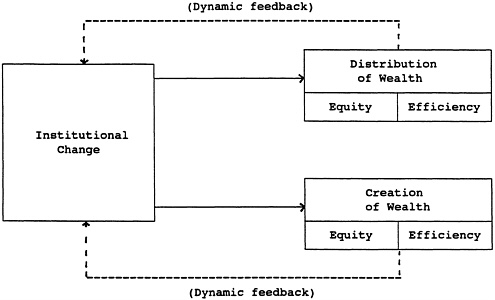III
. RESEARCH AGENDA
Figure 1. A schematic model of the effects of transition in FPEs.

The panel established a set of guidelines to assist in the design of research projects to describe and analyze the process of institutional change. First, research should go well beyond the mere identification of legislative or regulatory change(s); it should focus on empirical work that indicates whether and how institutional changes are altering the behavior of economic actors, be they households, enterprises or government institutions. Care should be exercised to avoid equating changes in labels with changes of state or behaviors. Most importantly, the panel expressed interest in research that offers innovative indicators of the transition process (see below for examples), new ways to organize and exchange knowledge
about HPEs, and new data bases for analysis.
The panel identified changes in the following institutions as significant for the transition process:
-
Economic information systems (accounting and reporting)
-
Property rights
-
Labor markets
-
Cash and credit (monetization)
-
Financial system (banking, stock exchanges, bonds)
-
Price mechanisms (fiat or variants of market determination)
-
Environmental management and regulation
-
Health care
-
Industrial ownership (small and large scale privatization)
-
Industrial organization (demonopolization and conversion/demilitarization)
-
Fiscal federalism (decentralization of locus of economic regulation, tax collection)
-
Rules governing foreign investment
-
Legal institutions for transactions (administrative allocation, contracts)
The panel suggested that research on institutional changes should explicitly take into account their impact on critical equity and efficiency considerations. Under the heading of equity the panel identified as important the dimensions of income distribution, consumption distribution, and asset (or access) distribution. It also endorsed the utility of research that would examine such non-traditional issues as distribution according to ethnic group, geographical region, and political alignment.
The Panel identified increases in the following as criteria of efficiency:
-
Productivity and quality of product
-
Profitability
-
Competitiveness
-
Utility/welfare (income adequacy)
-
Technology/application of knowledge
-
Replicability
-
Specialization
-
Proliferation of new enterprises
The Panel provided the following examples as indicative of some of the lines of research it considers potentially productive:
Change in the information system. The panel suggested that researchers identify existing accounting or reporting institutions and processes and indicate the change(s) instituted during the transition period. The researcher would then identify any new incentive structures that might have developed that either encourage or discourage accurate accounting or reporting. These might include such measures as legislation requiring the official registration or licensing of transfers of property, or the registration of contracts, in order for these transactions to be legally enforceable. Such measures could serve as indicators in studies of transition in the information system of any HPE.
The Panel noted that a trade-off often exists between reliability and “openness” of information systems. Individuals and enterprises can be expected to resist collection efforts that may impose burdens on them and to fully disclose information about their activities only when they can anticipate benefits or when they are granted guarantees that information will be privileged. Measures of trust and confidence in the new reporting structures, and of the credibility of the new political arrangements that underwrite them, could therefore also be used as indicators of movement through the transition. Finally, the researcher should specify the effect of the changes in the information system on the behavior of economic actors.
Monetization. Accurate information on currency flows in these economies will be particularly revealing in light of the fact that very few republics have developed anything more than the most rudimentary of banking and credit systems. Almost all acquisitions of property take place on either a cash or barter basis, particularly in the household sector. A simple Fisherian equation of exchange was suggested as-one appropriate starting point for such an analysis. Such an investigation could inform the development of GNP measures, the compilation of input-output accounts, and track the gross flows of funds through the economy. Innovative measures of the velocity of currency flows could also provide important information on the total volume of cash payments, a particularly useful measure for the determination of a variety of economic indices.
Financial, particularly banking system reform. Researchers could develop indicators of institutional change(s) and investigate the impact of the change(s) on various measures of equity and efficiency. Finally, the research could address the behavioral effects of the change in order to determine whether responses to the reform are likely to sustain it or undermine it. Labor markets and labor mobility. One particularly useful way to address this issue would be to focus on the development of reliable, innovative indicators. At the present time, and for the foreseeable future, we can not expect the official statistical agencies in these countries to produce reliable, detailed statistical information. Empirical data could, however, be developed from case studies on a wide variety of measures such as wage differentials, quit rates, length of time spent in lines, duration of unemployment, length of time in current jobs, and the number of wage earners per household. The broad possibilities for sample research, with or without local collaborators, offer particularly good opportunities for research on topics of this type. Sustained data collection efforts, such as those of the National Longitudinal Survey or the General Social Survey, could produce particularly significant data.
Sample survey research could also elicit indicators of the restrictions that continue to




